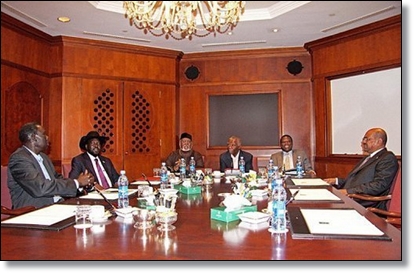Dispute Resolution: A Road Map
 |
|
Former South Africa president Thabo Mbeki seeks to resolve disputes between Sudan and South Sudan. P.courtesy |
We are seeing an increase in conflicts again, brought about by unconstitutional changes of governments, disputed elections, social tensions, extremist ideologies, and territorial or border disputes among other causes. We must redouble our efforts to resolve conflicts and disputes through peaceful means and in conformity with justice and international law as enshrined in the Charter of the United Nations.
Conflicts are best handled, first and foremost, by the political actors and citizens of the country in question, following democratic principles and guided by the equality of all persons before the law. In cases where national actors cannot resolve the problem, for some reason, then the sub-regional organisations should step in. These would include, in the case of Africa, the East African Community (EAC), Inter-governmental Authority on Development (IGAD), the International Conference of the Great Lakes Region (ICGLR), the Southern African Development Community (SADC), the Economic Community of West African States (ECOWAS) and others.
The United Nations and the international community would then provide the necessary support to the sub-regional and regional initiatives. Our recent achievements in the peace processes in Burundi, Sudan/South Sudan, and Somalia, among others, attest to the progress we can achieve working together. The advantages of such an approach include utilizing actors that have more discerning knowledge of the problem, those that are in close proximity and with a greater stake in having the problem resolved, as well as the international support and legitimacy that the United Nations provides.
The current ICGLR initiative on the situation in Eastern Democratic Republic of the Congo (DRC) is based on this experience. This regional initiative is aimed at addressing the root causes of the conflict in Eastern DRC, deployment of a Neutral International Force, and responding to the humanitarian crisis.
Our preference for homegrown solutions is premised on the realization that external influences or interventions do not necessarily offer sustainable solutions to resolve conflicts. On the contrary, external interventions often contribute to a cycle of destabilizing tendencies which is why we are still grappling with situations like the one in Eastern DRC. The African Union has shown strong political will to resolve conflicts on the continent peacefully, and to contribute towards maintenance of international peace and security. We call upon our partners to support the dispute resolution mechanisms as well as the peace and security efforts of the AU and sub-regional organizations.
Regional initiatives need to be complemented by international support including assisting countries emerging from conflict to build requisite capacities for the consolidation of peace. It is also important that such support includes provision of immediate post-conflict humanitarian assistance and material inputs for reconstruction and development.
We welcome the continuing deepening of cooperation between the United Nations, regional and sub-regional organizations in the resolution of conflicts and maintenance of peace and security. This positive trend should continue, and every effort should be made to avoid repeating the mistakes of the past.
Conflicts that might arise between and within countries should be resolved through dialogue amongst all the parties concerned. We have witnessed, in the recent past, regrettable instances in which peace initiatives have been frustrated through intransigence of the parties with support from some members of the international community. This can only be a recipe for long-term turmoil and instability in the affected countries and neighbouring regions.
In situations of armed conflict, the first priority should be securing a verifiable ceasefire, followed by a political process involving an all-inclusive dialogue without pre-conditions. It is up to the parties, with the assistance of a mediator or facilitator, to reach a settlement that addresses their interests.
There is no doubt that resolving conflicts requires identifying and addressing their underlying causes, which include social, political and economic factors that are often deeply entrenched and interwoven. In seeking to resolve any conflict, national, regional and international actors need to adopt approaches that take into account these complexities.
First, it is important to address the substantive issues that give rise to conflict in the first place, such as lack of access to or equitable distribution of resources, social or political exclusion and other grievances. The linkage between development and security in peace building is now widely recognized and once conflicts are resolved, the affected communities need peace dividends in terms of delivery of basic services such as health and education as well as opportunities for employment.
Second, efforts should be made to diffuse the fear, hatred, and other negative emotions that make conflict intractable and often violent. We must collectively speak out against intolerance and extremism in order to advance mutual respect and understanding of the values and beliefs of others.
Third, political leaders and all actors need to forge national reconciliation, including through transitional justice mechanisms, as well as establishing Truth and Reconciliation mechanisms which play a key role in promoting durable peace. We would also like to reiterate the need to increase the role of women and the youth in peaceful settlement of disputes given the significant contribution they can make.
On the Israeli-Palestinian question, both parties ought to negotiate and reach a peaceful settlement based on a two-state solution; a Palestinian State living side by side with Israel in peace, security and mutual recognition.
We reaffirm our commitment to peaceful settlement of conflicts, and fostering international cooperation based on the principles of sovereign equality, justice and adherence to international law.
By H.E. Edward Kiwanuka Ssekandi
The Vice President of the Republic Of Uganda.
